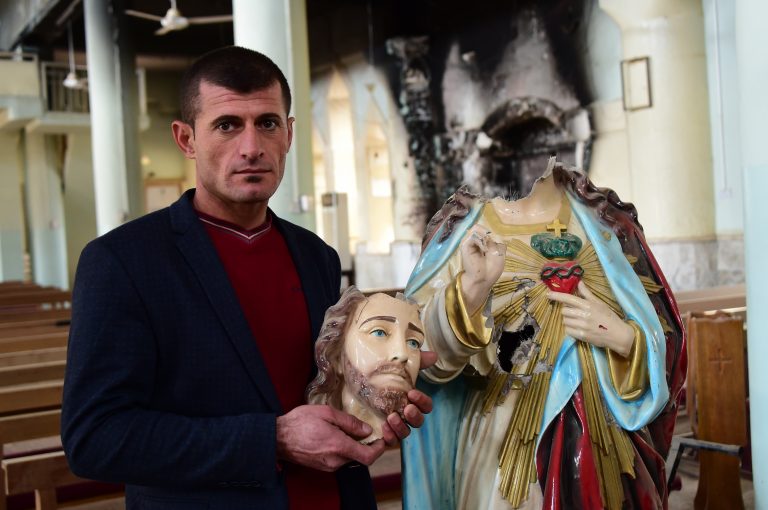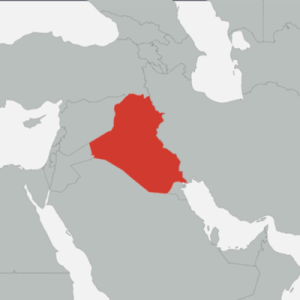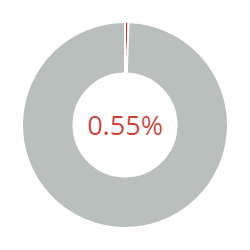Iraq
Persecuted and Forgotten?
A report on Christians oppressed for their Faith 2015-17

KEY INDICATORS & FINDINGS
Daesh tried to eliminate Chrisitianity in areas under their control, including by destroying churches and forced conversion. Central government legislation prompted fears Christian children could be forced to renounce faith.
STATISTICS |
PROFILE
The evidence on the ground in Iraq collected by Aid to the Church in Need and Church leaders with whom the charity is working closely showed that a genocide against Christians and other minorities was carried by Islamist terror group Daesh (ISIS), both before and within the period under review. Reports revealed that acts of aggression carried out by militants have given concrete form to their intentions to eliminate Christianity in areas under their control. These conclusions were substantiated by Aid to the Church in Need fact-finding and project-assessment trips in areas, especially those from which Daesh had recently retreated. Assessing the findings of such trips, Rev’d Dr Andrzej Halemba, ACN Middle East Projects’ coordinator, stated: “Iraqi Christians have very clearly suffered genocide by Daesh. It’s not just a physical extermination but [the crimes committed] fulfil the legal definition in the UN International Convention [of] 1948.”
In areas seized by Daesh from June 2014 onwards including Mosul and the nearby Nineveh Plains, regions formerly home to significant numbers of Christians and other minorities, it is now clear that a comprehensive programme was enacted to eradicate the Church’s presence. Daesh authorities often presented Christians with the choice: convert to Islam, pay a fine or face “death by the sword” . The exodus that followed meant that there were virtually no Christians left. Similarly, there was a systematic desecration of churches. Some were destroyed and others converted for use such as military bases, prisons and armouries. Altars were smashed, statues beheaded, blasphemous graffiti scrawled and sacred tombs disturbed, and their contents – including the remains of revered Church figures – removed.
Local Christian woman Manal Matti told ACN of “the destruction caused by the jihadists” including the desecration the Holy Immaculate Conception Church in Qaraqosh, which, before it fell in summer 2014 was the last Christian majority town in Iraq. She said: “The jihadists used the church as a shooting range and the mannequins as targets.” St George’s Syriac Catholic Church in the city was used as an improvised bomb factory. The extremists wrote battle plans on church walls. Another Christian, Louis Petrus, returned in early January 2017 to Qaraqosh, having fled when Daesh invaded in August 2014. He said: “The Daesh terrorists have destroyed a lot of my possessions… Many houses have been burned or even completely destroyed.”
As Daesh’s grip in northern Iraq waned, accounts of Christian persecution began to come forward in late 2016. Speaking to ACN, 16-year-old Ismail described how Daesh threatened to kill him if he refused to convert to Islam and that he was beaten for wearing a cross around his neck. One of the few Christians to remain in Qaraqosh during Daesh’s occupation was elderly Iraqi Christian woman Zarefa who stayed to nurse her dying husband. After his death, the extremists found a crucifix and, at gun point, forced her to spit on a cross. They also tried to force her to convert, again at gun point (see January 2017 below). Christian women Barnadet and Sabria remained in the once predominantly Christian town of Tel Kaif, north-east of Mosul, during Daesh occupation. After Sabria’s home was burgled by Daesh, she lived for two years sleeping on just a mattress on the floor.
Daesh violence caused Christians to migrate en masse. The extent of the exodus raised the threat that Christianity could disappear from Iraq. A Church, whose roots according to tradition dates back to the first century AD, is at risk of extinction, not only as a result of forced expulsion but also the loss of confidence among remaining Christians who fear for their safety. A number of displaced families have left the country, believing there is no future in Iraq, and in this state of flux figures for the number of Christians remaining in the country are difficult to determine with any accuracy. However, since 2015, Iraq’s beleaguered Christian community has fallen from below 300,000 to – according to one estimate – perhaps as low as 150,000. Unless there is a dramatic reversal in fortunes, this trajectory suggests that an end to Christianity could be imminent, possibly within the next three years. Archbishop Bashar Warda of Erbil, northern Iraq stated in May 2017 that displaced Christians in Kurdish northern Iraq number as many as 100,000. Speaking to the UK Parliament, Stephen Rasche, Aid Programme Coordinator for the Chaldean Archdiocese of Erbil, said: “In terms of finding a future for the displaced Christians we are looking after, we are running out of time. In fact, we are in extra time. The susceptibility of Christians to disappearance from Iraq is acute.”
The majority of displaced Christians sought shelter in Erbil. In June 2017 there were around 12,000 registered families (approximately 95,000 persons), mostly Christians but including other minorities, being cared for by an inter-denominational committee headed by the Chaldean Church. Mr Rasche stressed that that no UN funding had been received except a limited amount soon after the displaced people arrived. Almost all the funding has come from Christian charities – with Aid to the Church in Need providing more than half of the total aid.
In March 2017 the Syriac Catholic, Syriac Orthodox and Chaldean Catholic Churches formed the Nineveh Reconstruction Committee to put in to action plans to rebuilt or repair almost 13,000 homes in the Nineveh Plains. ACN surveys showed that displaced Christians definitely intending to return had gone up from 3.2 percent in November 2016 to 41 percent by the following February. By May 2017 around 700 Christians had returned to Teleskuf, a town with comparatively minimal damage after only brief spells under Daesh control. Its relative proximity to Erbil had afforded it more security than other parts of the Nineveh plains. In January 2017 it was the first village to which displaced Nineveh families returned.
The forced retreat of Daesh opened up new issues. Father Halemba explained: “Christians are now more afraid of their citizenship rights under [the] Baghdad and Kurdistan governments. They are not being supported by Baghdad, Kurdistan or international bodies… It has had disastrous consequences – Christians are not now deemed citizens of Iraq.” Comparing Christian families to grass trampled underfoot by “elephants fighting”, he said: “The Christian villages will be divided up between Baghdad and Kurdistan. This is disastrous for Christians and now that they are displaced it’s much more difficult.” He added: “If they are not citizens they will be forced to leave the country. It’s important that they return to their villages as citizens of Iraq.” Father Halemba also said: “In Iraq they are being deprived [of] citizenship. This stops them feeling Iraqi in themselves. Christians are being used against the Kurdish ‘government’, who depend on financial aid from Baghdad. But [the] Baghdad government wants the oil and control.” Concerns about the status of Christians in Kurdish-controlled areas come amid reports that the Kurds “encroached” on Christian-controlled land and imposed travel restrictions on them.


